Successors, Fourth Edition (S4E) is the latest edition of this 1997 Avalon Hill classic co-designed by Richard Berg and Mark Herman. Released by Phalanx Games in 2022, S4E can be played by up to five players, each controlling two or more generals depending on the player count. Each general is a Satrap, or governor, controlling a province of Alexander’s empire, along with Macedonian and Mercenary troops drawn from across the empire, even war elephants. Players will use their generals to conduct sieges, raise troops, move their armies, and of course, conduct battles.

This is not just a simple reprinting of previous editions. Phalanx has lovingly created a deluxe edition of the game much as they did with Hannibal & Hamilcar. The components – more on them later – are gorgeous, and include more generals, scenarios, and cards than previous versions. Phalanx added ten new optional rules and made other rule changes. Players of previous editions will recognize the family resemblance but will need to review the rules to fully grasp the changes.
Victory Points or Legitimacy?
One of the original innovations of Successors was the dual path to victory. Players can win instantly by either gaining a specified number of Victory Points (VPs), depending on player count, or by accumulating 18 Legitimacy. VPs primarily come from controlling provinces, but also through other means, such as possessing the largest fleet or controlling the Hellespont, the narrow strait between the Aegean and Black Seas. Legitimacy is awarded for control of important personages who were members of Alexander’s royal family, or through a variety of other events. For example, Alexander’s body lies in a funeral cart in Babylon at the beginning of the game. If you bury Alexander’s body in the Macedonian capital of Pella, you gain a whopping ten legitimacy points! But if buried elsewhere, you gain only two legitimacy points provided you control that space.
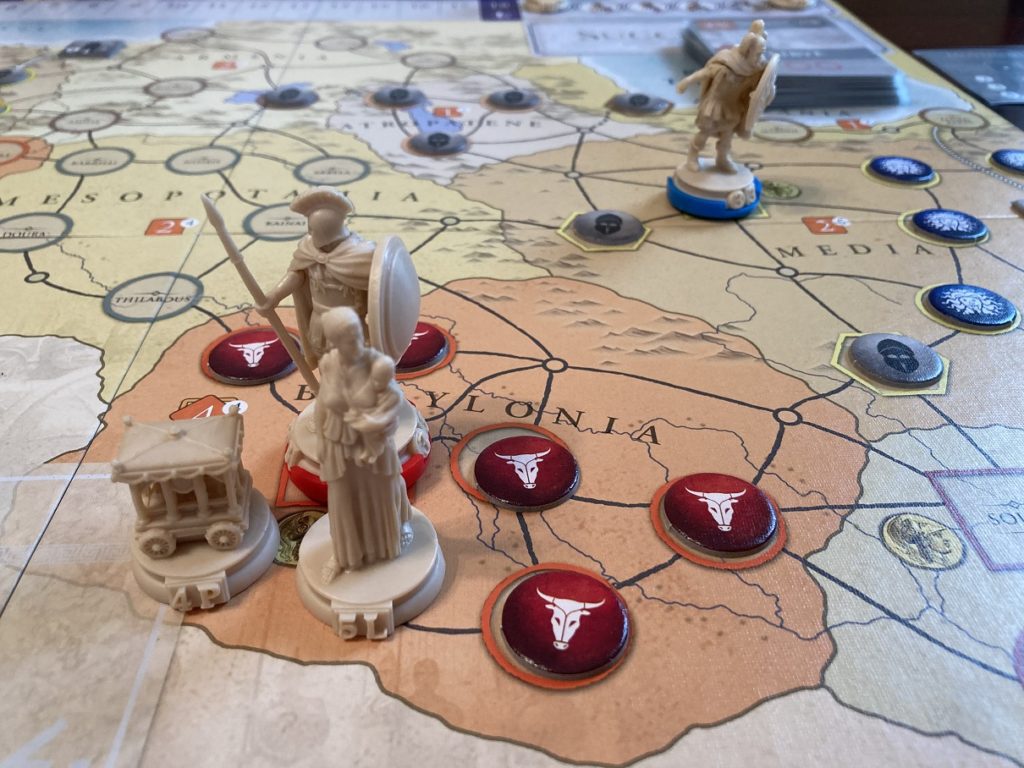
Both are controlled by Perdikkas.
The board contains two separate tracks for recording players’ current VP and Legitimacy totals. The totals can change mid-turn, so players will need to keep an eye on their opponents’ status to see if they are getting close to an instant victory. The number of VPs also has other important game effects which we’ll discuss shortly.
Players can also gain what the game refers to as a Regency victory. This is achieved by controlling specific Royal Family members at the end of certain turns and having the greatest sum of VPs and Legitimacy. This simulates one of Alexander’s heirs being supported by a powerful Regent, effectively making that regent the power behind the throne. Finally, if no players achieve an Instant or Regency victory by the end of the game, the player with the most VPs wins, and Legitimacy counts for naught.
Turn Sequence
There are only five turns in the game, each with multiple phases. To get a feel for how the game plays, we’ll briefly summarize what happens in each phase.
Preparation Phase
At the beginning of each turn during the Preparation Phase, certain turn specific events are announced. For example, on Turn I, no reinforcements are received, and no player can win an Instant Victory. Then the player with the most VPs is labeled the Usurper. What does this mean? Each player starts the game with 3 Legitimacy for being a Champion of the empire. However, once they attack another player, they become a Successor and permanently lose 3 Legitimacy. But not so if they attack the Usurper. The Usurper can be attacked at will with no impact to a faction’s Legitimacy. The final act of the Preparation phase is to determine which player goes first. This is decided by the player with the least VPs.
Reinforcements Phase
During the Reinforcements Phase, all players gain two Mercenary Combat Units (CUs) and any CUs, fleets, and generals in the Dispersed box. The player with the most VPs gets an additional two CUs. Each Mercenary CU provides one point in combat. Players can also gain a Loyal Macedonian CU by either controlling the province of Macedonia or by having the most Legitimacy. Macedonian CUs, either Royal Army or Loyal, are each worth two points in combat. We’ll discuss the difference between Loyal and Royal Army CUs when we get to combat. The last thing players do in this phase is to move their reinforcements to the board in turn order according to certain placement restrictions.
Shuffle and Deal Tyche Cards Phase
Next, all the Tyche (Greek for luck) cards in the draw deck and discard pile are shuffled together, and an equal number is dealt to each player. The number dealt varies depending on player count.
Strategy Phase
After this, the Strategy Phase begins. Each Strategy Phase is composed of five rounds (four rounds in a 5-player game) in which players, in turn order, perform the following segments:
- Surrender Segment – Remove enemy Political Control markers (PCs), place their own PCs, and conduct sieges.
- Tyche Segment – Play one non-Surprise Tyche card.
- Activation Segment – Move generals and their CUs or raise one Mercenary CU.
- Forage Segment – Remove one CU in each space that exceeds the Forage Limit of that space.
Like many other card-driven wargames, S4E uses a point-to-point movement map. Each space is either uncontrolled (has no PC marker), is controlled by an Independent PC, or is controlled by a player PC. Spaces come in four types: transit points that cannot be controlled, Minor cities, Major cities, and Strongholds. PCs can be placed in all spaces except transit points. Transit points represent difficult terrain that lacks sufficient resources to support more than three CUs during the Forage Segment. All other spaces can support up to eight CUs.
After the Surrender Segment, a non-surprise Tyche card must be played. Event Tyche cards can be played for either the event shown on the card or for their Operation Point (OP) value. OPs can be used to place PC markers, conduct a forced march with one of your generals, train troops, upgrade a fleet, or recruit a new general from the reserve. Bonus Tyche cards, designated with a gold bar at the top, can be played for both their event and OPs. The Surprise Tyche cards with the red bar can be played at any time, even during another player’s turn. After they are played, or discarded without activating their event, a new Tyche card is drawn from the deck.
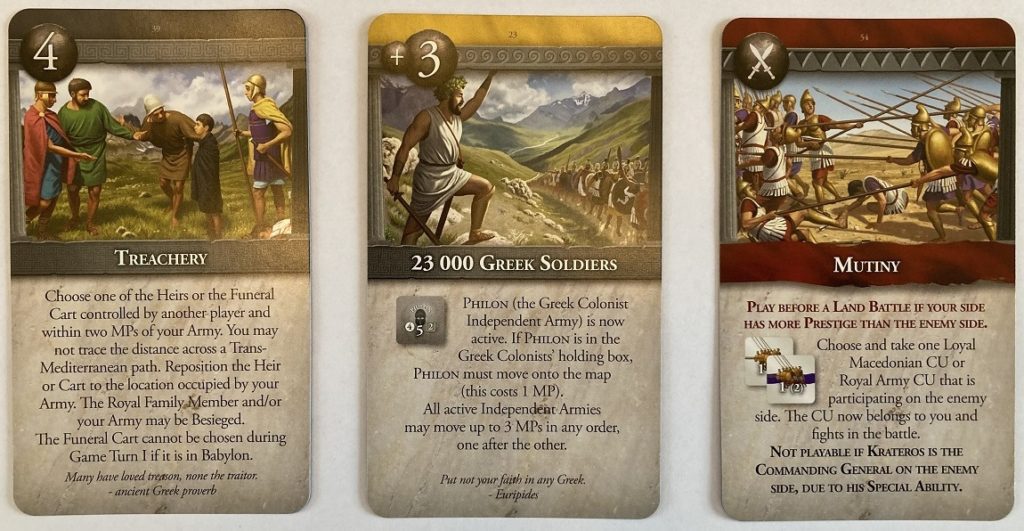
During the Activation Segment, players must first choose to either activate their generals or immediately gain one Mercenary CU. If they choose to activate their generals, they roll a single die and then compare the result with each of their general’s Initiative Rating to determine how many Movement Points (MPs) each general will receive. MPs can be used to move between connected spaces, conducting sieges, and removing enemy PCs from Minor cities. Moving a general and his army into a space occupied by another player’s CUs triggers combat. Like many other card-driven games, players can attempt to intercept an enemy force that is currently moving or evade a force that is going to move into their space.
Isolation Phase
All players in turn order remove their PCs that are isolated. A PC is isolated if it cannot trace a path from the PC through connected spaces free of enemy PCs and CUs to a friendly controlled Major city or a friendly CU. Since PCs are removed in turn order, players may find that some of their PCs that are isolated at the beginning of the phase will be able to trace a path to a friendly major City or CU once other players are forced to remove their PCs. This can be a distinct advantage to the player with the least VPs since they decide which player goes first, and consequently, who goes last.
Sieges and Land Combat
Since this is a wargame, let’s take a closer look at the way conflict is handled, starting with sieges. Sieges are a way of eliminating enemy PCs and occur during the Strategy Phase during either the Surrender, Tyche, or Activation segments. Sieges do not cost anything during the Surrender segment, but those conducted during the Tyche and Activation segment require the besieging army to spend 2 MPs. A player must have at least 3 CUs in a space to conduct a siege.
A siege is successful after sufficient siege points have been accumulated; 3 siege points for a Major city, 2 for a Stronghold, and 1 for a Minor city. Each time a siege is attempted, players roll a single die, apply any applicable die roll modifiers, and consult the Siege table to determine the number siege points awarded and the number of CUs the besieging force loses. Accumulated siege points remain unless the besieging force no longer has any CUs in the space. Once the required siege points are met, the enemy PC is removed, but a friendly PC is only placed if the siege is completed in the Surrender segment. Thus, timing your sieges is very important.
Once combat is initiated between armies occupying the same space, each player starting with the Attacker decides if they wish to play a Surprise Tyche card which may alter the outcome of the battle. If there are any Royal Army Macedonian CUs on either side, players compare their generals’ Prestige value which is the sum of their faction’s Legitimacy and the general’s Popularity Points. The resulting number measures how willing Royal Army CUs – veterans who are not strongly attached to any faction – are to participate in the battle. If the Royal Army CUs are on the side with the lower Prestige, they choose to sit out the battle. Their CUs are not counted when determining combat and will switch over to the side that wins the battle!
After counting the total combat points available from Loyal, Royal Army and Mercenary CUs, players can add additional points from local troops. The faction that controls the battle space gets 1 Local Troop point, and the player who controls the province gets 2 points. If a faction has any elephant CUs, they roll one special Elephant die per CU. The total number of Elephant symbols rolled determines how many combat points they add to the total. Each player then rolls two dice changing the value of any individual die that is lower than the general’s battle rating to equal his battle rating. The resulting battle score determines the winner with ties being a draw. If a player’s modified combat roll is exactly 9, the commanding general rolls a die to see if he survives the battle. If you win the battle or it was a draw, your general is killed on a roll of 6. If you lose, your general is killed on a roll of 5 or 6.
As in any battle, both sides will lose CUs. In a draw, each player loses 1 CU. If you win the battle, you lose 1 CU of your choice. However, if their battle score was at least twice that of their opponent, they lose none. The losing faction must eliminate all Mercenary and Elephant CUs. All Macedonian CUs that participated immediately suffer attrition per the attrition table, and any survivors are sent to the Dispersed Box, along with any surviving generals. The defeated side also loses control of any Royal Family Members.
Components
The 33 x 22-inch game map is mounted, pleasing to the eye and easy to comprehend. The cardboard CUs, PCs and other markers are thick, colorful, and have pre-rounded corners, so no counter-clipping required. Each major general and heir/royal family member is represented by a uniquely sculpted plastic figure. Each player is provided with colored bases that snap onto the base of each figure to designate who controls them. Even Alexander’s funeral cart and tomb are represented by plastic figures. The game also includes cardboard stand-up pieces if players choose to use them instead of the plastic figures. There are also seven dice, two of which are the custom die used for combat involving elephants.
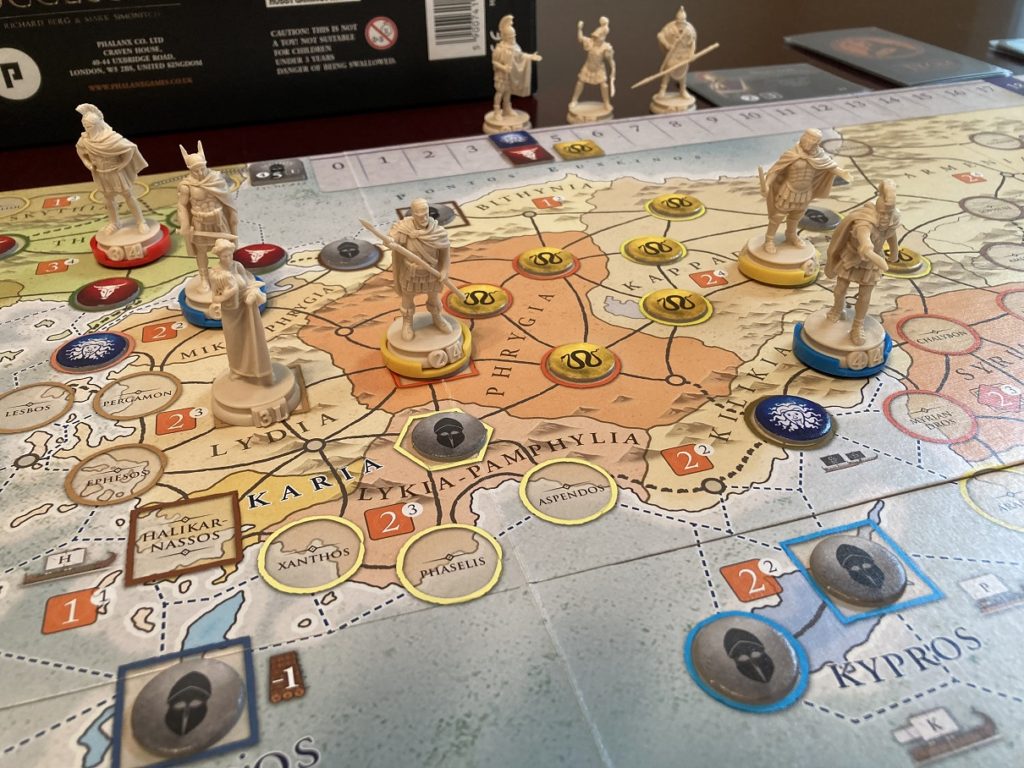
The game comes with three different card decks. One contains all the major generals in the game. Another contains a card for each province on the board that indicates the number of VPs it is worth if controlled, the number and types of cities that need to be controlled to control that province, the number of local troops that province provides in a battle to the side that controls it, and any fleets that are gained for controlling it. Finally, there is the Tyche deck. These large, tarot-sized cards are stunningly illustrated with the OPs (or crossed swords if a surprise card) clearly shown in the upper left-hand corner.

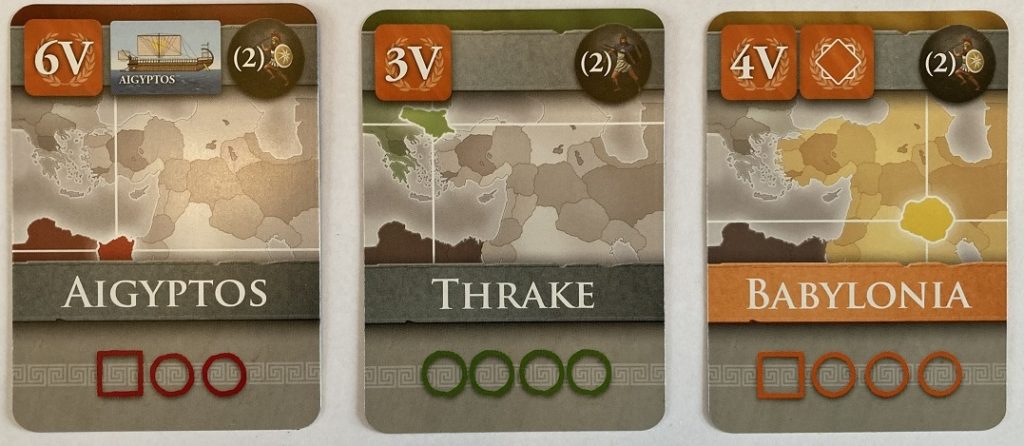
The 40-page rulebook is in color and contains numerous illustrations. This may seem daunting, but like most wargames, the rulebook covers all the specific details and edge cases. But soon players will find they can simply refer to the two-sided player aid (five are provided, one for each player) and only consult the rulebook for when they encounter unusual or confusing situations. The rulebook is accompanied by a 24-page Playbook that includes an 11-page, fully illustrated example of play covering all five phases of a game turn. In addition, 4 shortened scenarios are provided for 2, 3, 4, and 5-player counts, and designer notes.
Game Play Experience
S4E feels like a free-for-all, which is exactly what transpired following Alexander’s death. To be successful, players must use the generals, CUs, and fleets they are randomly assigned at the beginning of the game to their best advantage. The strategy players will opt to take will likely be decided by the Tyche Cards they are dealt each turn. For example, if you begin with the most VPs, and have cards that allow you to grab more quickly, you will likely pursue an Instant victory via VPs. However, you will have a big target painted on your back as the Usurper and will likely be attacked by multiple players each turn. On the other hand, if you have the most Legitimacy and have Tyche cards that can get you more, you will likely avoid direct conflict and seek an Instant victory through Legitimacy.
Players will need to make some tough decisions. Do you forgo activating your generals to raise a Mercenary CU? Do you use an Event card for its OPs or the event? Do you spend the OPs to place PCs or train troops? The decisions you make can significantly alter the course of the game. Players should look to maximize the potential benefit of each decision using the resources – CUs, OPs, and events – at their disposal.
Because the entire Tyche deck is reshuffled each turn, cards played the previous turn can rear their heads again. This can create dramatic reversals of fortune. For example, you may have played Tyche Event Card 47A the previous turn and been given control of the Silver Shields. These elite Macedonian CUs are worth 3 combat points each in battle. Once played, Event Card 47A is removed from the game and replaced with Tyche Card 47B. This Surprise card allows the faction playing it to steal ownership of the Silver Shield CUs, albeit at the loss of 1 CU. Likewise, other Tyche Cards may allow you to steal a Royal Family member or Alexander’s Funeral Cart. This could cause a major shift in Prestige that may force your Royal Army Macedonian CUs to sit on the sidelines and await the victor.
Surprise Tyche cards can be game-changing if played at the right time. And because you get to draw another Tyche card after playing a Surprise card, there is no reason not to use them. Likewise, the Bonus Tyche cards allow you to use both the event and OPs when played. If timed correctly, this too can be exploited. For example, you may be able to use an event to activate one of the independent armies to attack an opponent. They may not win the battle, but they could cause the loss of CUs which you can then exploit by using the OPs to activate one of your generals move and attack that player again.
Another unique facet of this card-driven game is the ability to move, and possibly attack, twice in the same turn. Players can use a Tyche card to Force March in the Tyche Segment, and then immediately activate that same general again in the Activation Segment. This double whammy could potentially disperse two enemy armies, perhaps in the same faction, leaving you free to gobble up cities and provinces uncontested.
There are many other aspects of the game, such as Naval Movement and Combat, how troops are trained to raise new CUs, marrying Royal Family members, etc. that we just don’t have time and space to address here. Suffice it to say that players can and should remain flexible and take advantage of circumstances as they unfold to influence the game’s outcome.
Final Thoughts
I played the original version of Successors many times. While I find S4E stunning in appearance and a blast to play once you grok the rules, the changes have made it a bit more complicated than the original. Some people may feel there is too much randomness in the game – the generals you begin the game with, the Tyche cards you’re dealt, the combat die rolls – and some will be put off by the playing time, especially at high player counts. Although this latter concern is somewhat ameliorated by the shorter scenarios available.
On balance, though, I think the positives more than outweigh the negatives. The randomness not only helps create the “fog of war”, but it also means S4E is eminently re-playable. Given the scarcity of multiplayer wargames on the market, I think gaming groups interested in wargames should give this one a try.
On his deathbed, Alexander was asked, “To whom do you leave the kingdom?” His reply was “To the strongest!” May you be the strongest.


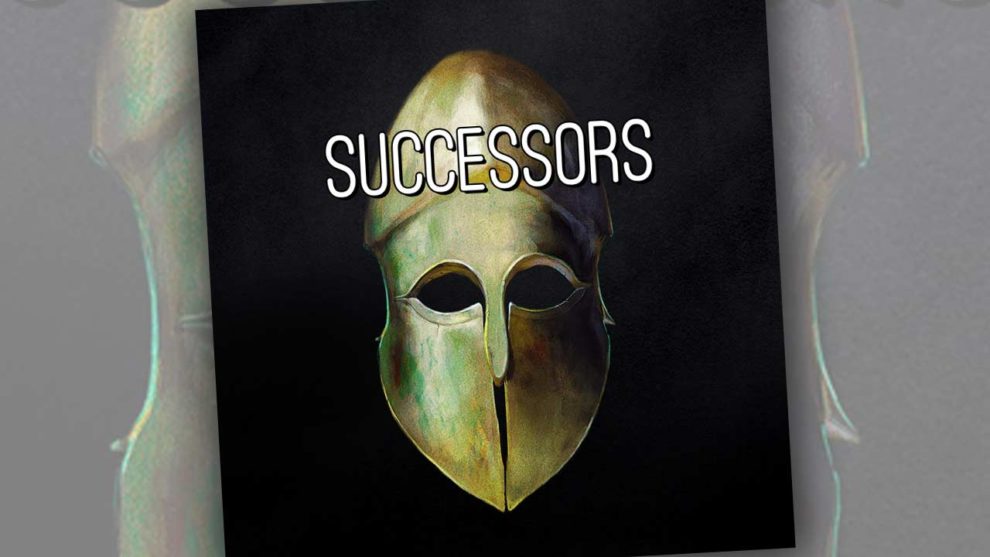









Add Comment